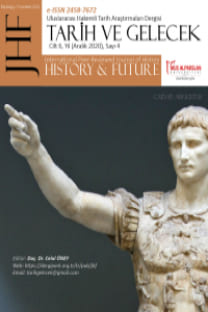İslam Dünyası Bilim’de Neden Geri kaldı
İslam dininin inançlar arasındaki uzlaştırıcı ve barışçı yönünün vurgulandığı günümüzde dahi, İslam dünyasında bilimin ve teknolojinin, çağımız kriterlerine uygun bir vaziyette ve hızlı bir şekilde gelişebilmesinin önünde diktatörel rejimler ve miktarı sabit olmayıp devamlı daha aza doğru giden maddi fonlar gibi engeller halen önemini korumaktadır. Bu nedenle İslam dünyasının bilim ve teknolojide çağı yakalaması ve bu paralellikte bilimsel üretimin nitelik ve nicelik olarak özellikle Batı ile yarışabilir konuma gelmesi için söz konusu Müslüman ülkelerin çoğunda, bazı değerlerin ve kurumların değişmesi gerekmektedir.
___
- Marshall G.S. Hodgson, The Expansion of Islam in the Middle Periods, vol. 2 of The Venture of Islam (Chicago, Ill.: University of Chicago Press, 1974), pp. 329-30.
- Ahmad Y. al-Hassan and Donald Hill, Islamic Technology: An Illustrated History (Cambridge University Press, 1986), p. 282.
- Marshall G.S. Hodgson, Rethinking World History: Essays on Europe, Islam, and World History (New York: Cambridge University Press, 1993), pp. 103-04.
- Bernard Lewis, Islam and the West (New York: Oxford University Press, 1993), p. 183.
- Nancy Gallagher, Egypt's Other Wars: Epidemics and the Politics of Public Health (Syracuse, N.Y.: Syracuse University Press, 1990); idem., Medicine and Power in Tunisia 1780-1900 (London: Cambridge University Press, 1983).
- Adel A. Ziadat, Western Science and the Arab World: The Impact of Darwinism 1860-1930 (New York: St. Martin's, 1986).
- A.B. Zahlan, Science and Science Policy in the Arab World (London: St. Martin's, 1980) is a thorough, critical survey.
- Ziauddin Sardar, Science, Technology, and Development in the Middle East (London: Longmans, 1982). This is the latest country-by-country survey of universities and research centers.
- Abdus Salam is not a mainstream Muslim, however, but belongs to the Ahmadi sect, which the Pakistan government in 1974 declared to be not Muslim.
- Africa Contemporary Record, vol. 21 (New York: Holmes & Meiers, 1992), p. B521.
- Arthur L. Lowrie, ed., Islam, Democracy, the State, and the West: A Roundtable with Dr. Hasan Turabi (Tampa: WISE Monograph Series, University of South Florida, 1992).
- Hoodbhoy, Islam and Science: Religious Orthodoxy and the Battle for Rationality (London: Zed, 1991), pp. 140-54.
- Abd al-`Aziz az-Zuhayri, quoted in Gallagher, Egypt's Other Wars, p. 146.
- All translations are from The Koran, trans. N.J. Dawood (New York: Penguin, 1980). Interestingly, many of the Qur'anic verses most problematic for science derive from Biblical concordants.
- Ira Lapidus, A History of Islamic Societies (New York: Cambridge University Press, 1988), p. 728
- Quoted in Albert Hourani, History of the Arab People (Cambridge, Mass.: Harvard University Press, 1991), p. 308.
- Sayyed Hossein Nasr, The Need for a Sacred State (Albany: State University of New York Press, 1993).
- Ziauddin Sardar, Science, Technology and Development in the Muslim World (London: Croom and Helm, 1980); idem, Science, Technology, and Development in the Middle East. He defines a prescriptive Islamic science in Explorations in Islamic Science (New York: Mansell, 1989).
- On this general problem, see James Coffman, "Does the Arabic Language Encourage Radical Islam?" Middle East Quarterly, Dec. 1995, pp. 51-57.
- E. Jeffrey Stann, foreword of Science and Technology in the Americas: Perspectives on Pan-American Collaboration (Washington, D.C.: American Association for the Advancement of Science, 1993).
- Ranked globally by regions, the Middle East is ahead of sub-Saharan Africa, slightly behind Latin America, and increasingly behind East Asia in terms of scientific expenditures and output.
- National Academy of Sciences, Scientists and Human Rights in Syria (Washington, D.C.: National Academy Press, 1993).
- Yayın Aralığı: Yılda 4 Sayı
- Başlangıç: 2015
- Yayıncı: Celal ÖNEY
Sayıdaki Diğer Makaleler
Balkanlarda Kiliseler Sorunu Örneği Olarak: Fermiliyan Meselesi (1897-1902)
İslam Dünyası Bilim’de Neden Geri kaldı
El Efdal Bin Bedr’ül Cemali Ve Ortadoğu Siyasetine Etkisi
Hamdullah Suphi’nin Haleb Hatıraları I
Osmanlıların Kuruluşuna Dair İkilemler
Tekelioğlu Sinan Bey’in Günlüklerinde Milli Mücadeleye Karşı (Çıkan) Yerel Unsurlar
